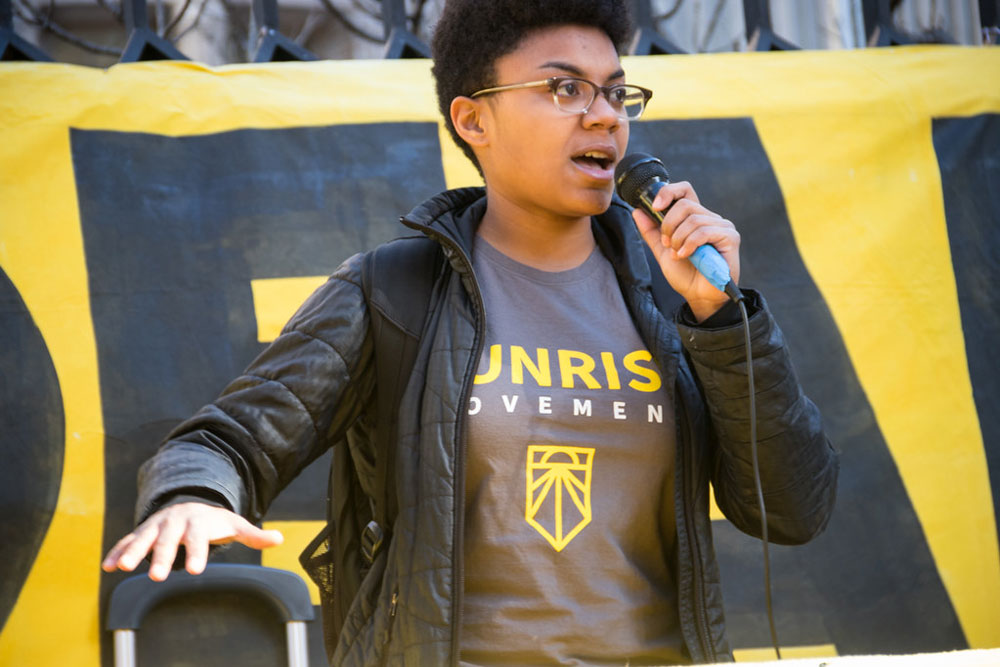
As we’ve written in NPQ before, our attention should be on movements, not politicians, to guide our world forward. Few are better positioned to represent the grassroots movements that will influence future policy than the generation of young people already organizing to protect the environment while centering justice in their work.
Although people of all ages support climate justice, Generation Z, defined by Pew Research Center to constitute those born between 1996 and 2012, is often at the forefront of climate activism. In this generation are many determined youth who grew up witnessing the power of collective action, but are being told they have less than a decade to avert climate disaster. How could we expect anything less than bold, unapologetic action?
Born from a realization that the climate crisis is rooted in structural systems of oppression—capitalism, colonialism, racism, and patriarchy—youth-led, values-centered organizations seek not only climate justice but collective liberation.
Worldwide, these organizations include Fridays For Future, the International Youth Climate Movement (IYCM), and the Sunrise Movement. These groups are decentralized, typically organized into chapters and cohorts, creating space for hundreds of thousands of youth to assume leadership roles. The Global Climate Strike on March 15th, 2019, alone brought 1.6 million students to protest in the streets. By spreading their resources throughout the world and equipping each chapter with tools to lead nonviolent protests and strikes, individuals are empowered to join the movement for climate justice.
Decentralization is critical because the climate crisis impacts different communities in distinct ways. For some, clean water is a pressing issue; for others, it may be deforestation. Arm in Arm, for example, a Sunrise Movement sister organization, seeks to build “massive decentralized escalated action through 2023” through an organizing model of autonomous hubs anyone could start in their own community. Arm in Arm provides organizers with resources and trainings on current policies and nonviolent protests. They published the Beautiful Trouble Toolbox, available in seven languages, with an international network of 70 artist-activists-strategists to help climate justice movements become more effective.
By using decentralized forms of organizing, young activists can collaboratively tackle the climate emergency while also centering their environmental justice work on issues that most affect their communities. The governance structure of these organizations is important because it provides a glimpse into how the world might one day look: Everyone who has a stake has a voice. These youth-led climate movements are practicing a form of participatory democracy that the US could only dream of having.
Sign up for our free newsletters
Subscribe to NPQ's newsletters to have our top stories delivered directly to your inbox.
By signing up, you agree to our privacy policy and terms of use, and to receive messages from NPQ and our partners.
Their climate policy activism is proving successful, including recent wins for the Sunrise Movement. According to CNN, Joe Biden’s administration described the group as “bold thinkers (who) know how to pull every lever of government to take on the urgent, existential threat of climate change.”
Fridays For Future and IYCM have focused more on the global level. IYCM has had regional climate networks present at the United Nations Climate Change Conference and successfully lobbied for “youth” to become an official constituency, called YOUNGO, in climate negotiations. Fridays For Future has become one of the most globally influential groups, with exclusive access to world leaders and international media, Greta Thunberg as the face of the movement, and a claim to having mobilized 14 million activists in 7,500 cities.
While Thunberg may have catapulted youth-led climate strikes into the spotlight, it has been, and continues to be, young people of color who sustain this movement. Whether it is Mari Copeny advocating for clean water in Flint, Michigan; Amelia Telford fighting against fossil fuel extraction and global heating as an Aboriginal and South Sea Islander in Australia; or Elizabeth Gulugulu highlighting the impacts of the climate crisis on Zimbabwe, these fights are personal.
“It is people especially from the Global South, especially from Indigenous communities, who need to tell their stories,” Thunberg told a UN climate meeting in Madrid. “We talk about our future; they talk about their present.”
Tackling the crisis of climate disaster requires radical action. The young people driving the movement’s energy, and their approach to decentralized leadership, are a powerful testament inspiring millions of people from every corner of the earth.—Abby Clauson-Wolf













